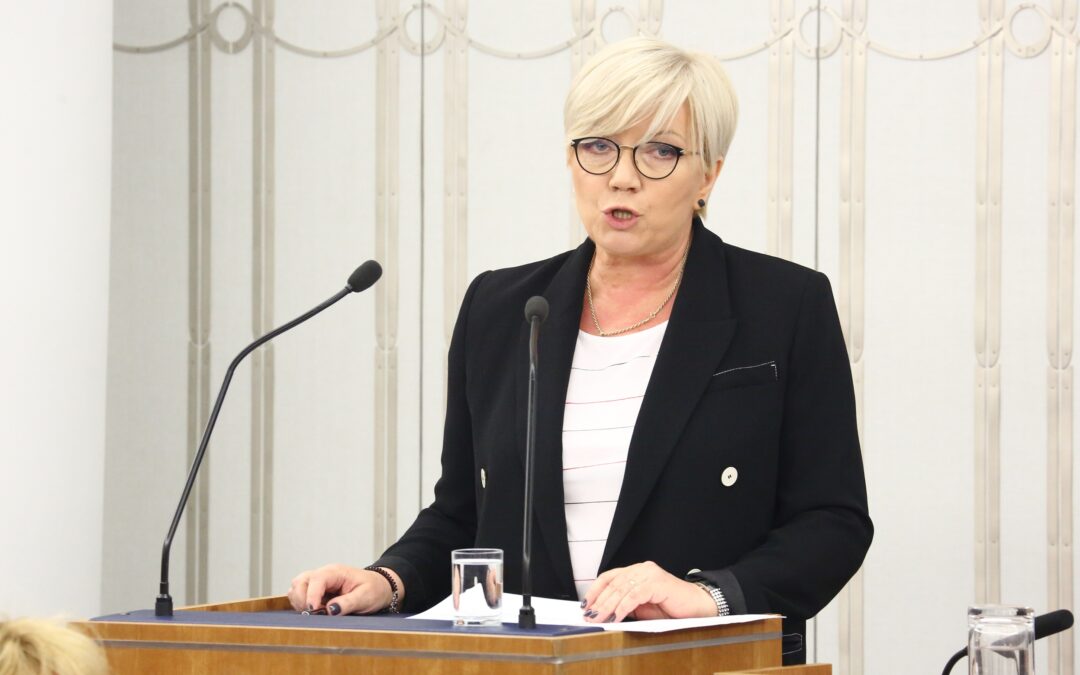The chief justice of Poland’s Constitutional Tribunal (TK) has received the backing of a majority of the court’s judges after a group of rebels who no longer recognise her legitimacy attempted to begin the process of nominating a replacement.
Questions still remain, however, about how the tribunal will function given its internal disputes. The issue is key to the passage of a judicial bill intended to unlock billions of euros of frozen EU funds, which cannot proceed until its constitutionality is assessed by the TK.
Sędziowie-buntownicy z TK domagają się wyłonienia nowego prezesa. Przyłębska odpowiada im uchwałą. W tle walka wokół wniosku Dudy o zbadanie ustawy o SN @d_sitnicka #TK #Przyłębska #bunt #Duda #KPO #ustawaSN #okopress https://t.co/fb4j30xrNu pic.twitter.com/Z9uNsDg3iY
— OKO.press (@oko_press) March 1, 2023
In January, six of the TK’s judges – 40% of its 15 members – called on the chief justice, Julia Przyłębska, to step down. They argued, as do some legal experts, that her term ended in December 2022. But Przyłębska says it actually runs until December 2024, and has received support in this position from the government.
Przyłębska is a close associate of Jarosław Kaczyński, chairman of the ruling Law and Justice (PiS) party, and during her leadership, the TK has widely been seen as being under the influence of PiS.
In the latest development, on Tuesday this week a letter leaked to the Do Rzeczy weekly showed that the six rebel judges had called for a general assembly of the TK to choose candidates for a new chief justice to succeed Przyłębska.
Six of the 15 judges on Poland's constitutional have called on its chief justice to step down.
They – along with many legal experts – say her term expired last month. But she rejects that argument, and has received support from the government https://t.co/ieNWTjeRBs
— Notes from Poland 🇵🇱 (@notesfrompoland) January 5, 2023
They noted that “this obligation has become particularly urgent due to the fact that on 21 February 2023 the tribunal received a request from the president…to examine the constitutionality of the act of 13 January 2023 amending the law on the Supreme Court and certain other laws”.
That is a reference to legislation approved in January by parliament that seeks to reform the disciplinary system for judges. The bill, proposed by the government, is intended to meet the European Union’s demands in order to unlock billions of euros in funds frozen over rule-of-law concerns.
Last month, after the legislation passed to President Andrzej Duda, he decided to ask the TK to assess whether it is consistent with the constitution. The law, and therefore the government’s intention to unlock EU funds, has therefore been put on hold until the tribunal issues a ruling.
For more on the judicial bill – which the government says will unblock frozen EU funds but which both the opposition and part of the ruling coalition claim is unconstitutional – see our report from yesterday https://t.co/mxWLyc6LNX
— Notes from Poland 🇵🇱 (@notesfrompoland) February 10, 2023
In response to the letter from the six rebel judges, Przyłębska did convene a general assembly of the TK yesterday. However, it did not choose candidates to replace her.
Instead, “by an absolute majority of votes, in the presence of two-thirds of the total number of judges, it adopted a resolution in which it was stated that there were no legal and factual grounds for selecting candidates for the position of the president of the Constitutional Tribunal”, announced a statement.
That means Przyłębska will remain in her position for now. But, given that a large proportion of the court’s judges do not recognise her legitimacy, it casts doubts over the tribunal’s ability to function and the legitimacy of any rulings issued by it under her leadership.
Poland’s constitutional court cannot adjudicate lawfully because it contains improperly appointed judges who “infect it with unlawfulness”, the country’s top administrative court has found in the latest ruling against the government’s judicial policies https://t.co/kN1h0BQGcB
— Notes from Poland 🇵🇱 (@notesfrompoland) December 6, 2022
Prime Minister Mateusz Morawiecki said in December that “there is no doubt” that the chief justice’s term lasts until December 2024.
Asked about the issue last month, President Duda told TVN24 only that there are two different views on the issue, without saying where he stands. However, he added that he hoped the TK could put aside its “internal quarrels” and “get to work” on assessing the constitutionality of the judicial law as soon as possible.
Speaking earlier this week to Polskie Radio, Przyłębska admitted that there are “dissenting views” views within her court but said it was “untrue and mistaken” to claim this will hinder the institution’s work. She noted that already this year, despite the internal dispute, the TK has issued ten rulings.
Regarding the bill referred to the TK by Duda, Przyłębska said that “we are moving quickly” thought added that she “cannot predict” when a decision will be made. “Certainly it will not take years, as the opposition claims.”
The dispute with Brussels – and within Poland's own ruling camp – over unlocking frozen EU funds offers both dangers and opportunities for the ruling party ahead of this year's elections, writes @AleksSzczerbiak https://t.co/PRNE8lUX4Q
— Notes from Poland 🇵🇱 (@notesfrompoland) January 5, 2023
Main image credit: Sejm RP/Flickr (under CC BY-NC-ND 2.0)

Daniel Tilles is editor-in-chief of Notes from Poland. He has written on Polish affairs for a wide range of publications, including Foreign Policy, POLITICO Europe, EUobserver and Dziennik Gazeta Prawna.




















